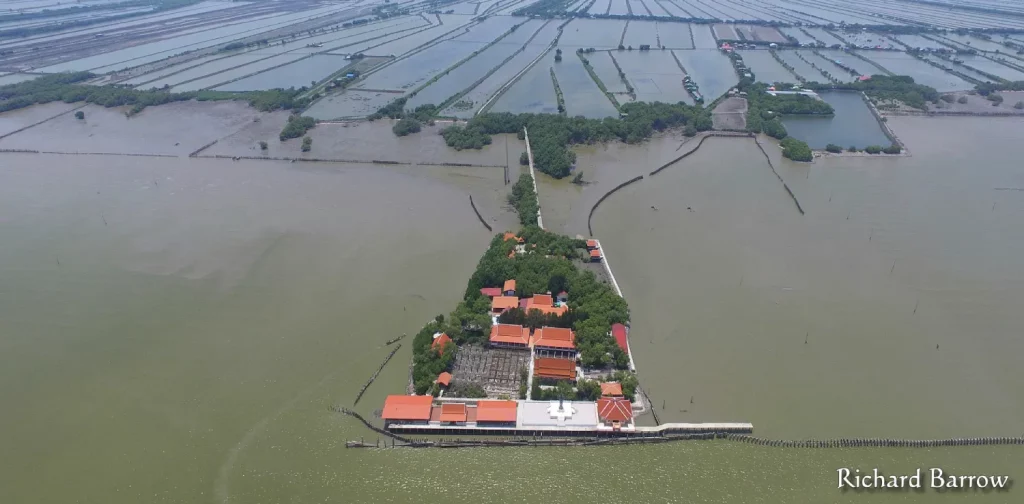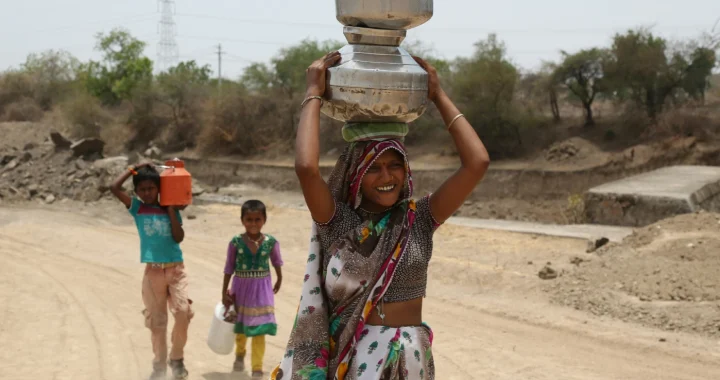Ban Khun Samut Chin, Thailand’s Coastal Village Swallowed by Rising Sea Levels

Photo: Richard Barrow on Twitter.
A school, a temple, some houses, and the tops of some electric poles. These are what remains of Ban Khun Samut Chin, a coastal village in the Chao Phraya Delta in Thailand. For decades, rising sea levels have been swallowing this village.
“I was born here. I have seen and can still see the changes happening,” said Wisanu Kengsamat, the village chief.
The Chao Phraya Delta might be experiencing the worst of Thailand’s shoreline retreat. Wisanu shares that about two square kilometers of Ban Khun Samut Chin land have disappeared in the past 60 years.
What’s Left of Ban Khun Samut Chin
The Buddhist temple in the village is essentially an islet. Supported by posts, it is surrounded by greenish water and connected to the mainland by a concrete footbridge. The school has been moved twice and is now elevated on concrete stilts. Only four students go to this school.
“Before, there used to be 100 households. Now it’s around 80. The population is halved,” said the village chief. Villagers have had to retreat inland, moving their homes up to eight times. Many have left entirely for school and after finding work elsewhere.
These days, about 200 people remain at Ban Khun Samut Chin. These villagers possess title deeds to their lands. Unfortunately, those lands are now underwater. Samorn Khengsamut, then-village chief, told Al-Jazeera, “The deeds are worthless, and now we live on land we don’t own.”
Rising Sea Levels and Mismanagement
The current sea level and ocean temperature are higher than ever. According to the World Meteorological Organization in the State of Global Climate 2022, the global sea level has risen 4.62 mm per year on average between 2013–2022. Then, sea levels will continue to rise for centuries even if global heating is limited to 1.5 degrees.
At Ban Khun Samut Chin, rising sea levels are made worse with mismanagement. Mangroves can act as a natural defense against strong waves and storm surges. However, much of the area’s mangrove forest was destroyed to build shrimp farms. Furthermore, dam developments on the Chao Phraya River result in the sediment pile-up that blocks the stream. Groundwater extraction also aggravated the issue.
Surviving
Sea levels rise, lands disappear, yet life goes on. The Ban Khun Samut Chin villagers now host eco-tourism homestay programs for income. They raise money and educate tourists about conservation and their fight to survive. They also work with Chulalongkorn University, putting in bamboo and concrete pillars and replanting mangroves as part of a research project.
At school, the students learn about the climate crisis, local ecology, conservation, and the village’s history. Jiranan, a student, shared, “I want to be a teacher so I can pass on knowledge to other students. I want to teach at this school if it’s still here.”

Co-create positive impact for people and the planet.
Amidst today’s increasingly complex global challenges, equipping yourself, team, and communities with interdisciplinary and cross-sectoral insights on sustainability-related issues and sustainable development is no longer optional — it is a strategic necessity to stay ahead and stay relevant.

Nazalea Kusuma
Naz is the Manager of International Digital Publications at Green Network Asia. She is an experienced and passionate writer, editor, proofreader, translator, and creative designer with over a decade of portfolio. Her history of living in multiple areas across Southeast Asia and studying Urban and Regional Planning exposed her to diverse peoples and cultures, enriching her perspectives and sharpening her intersectionality mindset in her storytelling and advocacy on sustainability-related issues and sustainable development.


 Embracing the Business Value of Sustainability
Embracing the Business Value of Sustainability  American Farmers Call for Government Support Amidst PFAS Contamination
American Farmers Call for Government Support Amidst PFAS Contamination  Asia Pacific’s SDG Progress Faces Major Setbacks
Asia Pacific’s SDG Progress Faces Major Setbacks  Exploring the Bidirectional Relationship Between Olympic Games and the Environment
Exploring the Bidirectional Relationship Between Olympic Games and the Environment  The Hidden Threat of Tire Pollution to Salmon Populations
The Hidden Threat of Tire Pollution to Salmon Populations  Understanding the Climate-Care Nexus
Understanding the Climate-Care Nexus